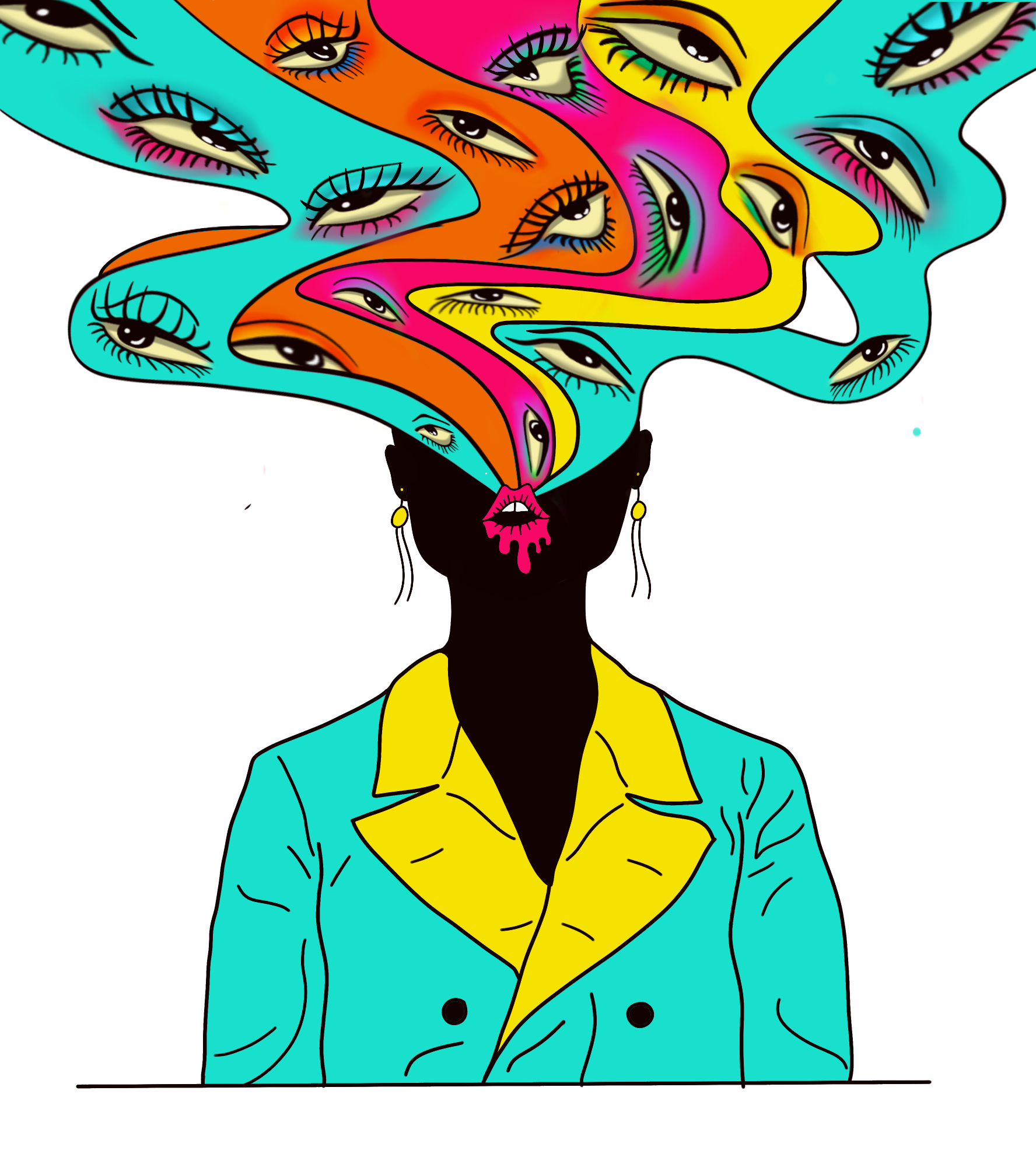Ecstasy Heals
MDMA clinical therapy trials have proven to treat PTSD patients
Written by Maya Herzog, Contributing Writer
Illustrated by Emily Han, Contributing Illustrator and Designer
Over the past couple of years, the approaches to facing mental health have changed. Methods of treating mental illness are evolving, as buzzwords like “microdosing” and “healing your inner self” take over social media and the mental health sphere (Handy, 2022). More recently, various trials conducted by the Multidisciplinary Association of Psychedelic Studies (MAPS) in the U.S. explored the guided use of methylenedioxymethamphetamine (MDMA) for post-traumatic stress disorder patients. MDMA is commonly known as Ecstasy or Molly, but how does a drug commonly used in the party scene help treat PTSD patients?
PTSD is clinically defined as a psychiatric disorder which occurs after a traumatic event, such as a natural disaster, a serious accident, a terrorist act, war or sexual violence (Torres, 2020). There is an assumption around PTSD that veterans are the only people who can suffer from the diagnosis; however, sexual violence is the leading cause of this disorder (Julia, 2022). Innovative therapy, such as the use of MDMA, could minimize the damaging effects on the total percentage of people who suffer.
While MDMA is stereotyped to be the “love drug,” it can also invoke feelings of relaxation and safety (Gains, 2022). Guided therapy uses this drug to promote these feelings. The drug allows the brain to revisit the painful trauma and heal itself without physical experiences like panic attacks (Nuewer, 2021). Rick Doblin, the co-founder of the psychiatric study, said MDMA helps an individual feel safe in the moment so traumatic memories are not overwhelming (Carroll, 2021). In party scenes, ecstasy may produce feelings of overwhelmingness or potential happiness. With help from experts, the drug can be used as a healing tool. When traumatic events occur, it is a common experience to block out or forget those specific scenes. Taking the MDMA allows the brain to process the traumatic event and start on the healing journey (How to Change your Mind, 2022).
Although psychotherapy is not approved by the Food and Drug Administration (FDA), they allowed a clinical trial in 2018. The trial took place over an 18-week period, with one session each week. The sessions varied from preparatory appointments to sessions where patients took the drug. Overall, researchers found 67% of the patients no longer met the criteria for PTSD after treatment. Researchers also found a reduction in suicidal behaviors and depression, although these results do not account for the long-term effects of other antidepressant medications (Mitchell, 2021). In the world of psychotherapy, this study was a success because hallucinogens can be considered a form of treatment.
One successful account came from Veteran Jon Luebecky. He reported panic attacks and anxiety almost daily from his PTSD that developed from his time in Iraq. Luebecky was a husband and father who was skeptical of the positive effects that MDMA would have on his life, but after the therapy, he realized the drug allowed his brain to process the emotional and traumatic events without the physical panic attacks (Carroll, 2021). Stories like Luebecky’s encouraged the FDA and other government agencies to consider legalizing PTSD psychotherapy. MDMA is predicted to be legalized by 2024 (Hasty, 2022).
Despite how revolutionary these findings appear, legalizing psychotherapy isn’t perfect. Psychotherapy is expensive; figures start at $200/hour for both the therapy and drug during the sessions (Rusciano, 2021). Medical advisors are unsure if insurance would cover this estimated cost. Further, only the most severe PTSD cases are receiving this treatment. Patients with minor PTSD symptoms are not eligible for this treatment, especially in the trial phase (Hasty, 2022).
The majority of psychedelic researchers are white, but diversity is critical since different cultures and races view the healing aspects of psychedelics differently. There are plans to include more BIPOC voices in future psychedelic research, specifically with the input of indigenous voices (Pezeshikan, 2020). Drugs used in psychotherapy are sacred to indigenous culture and deserve more credit for exploring their healing purposes (How to Change your Mind, 2022).
Psychotherapy provides PTSD patients with relief from habitual therapy and other prescribed drug intake. It is a new avenue for finding tangible solutions for those who struggle with mental health.
Sources:
Carroll, L. (2021, November 5). 'I'm better mentally now': Veteran shares experience of MDMA treatment for PTSD. TODAY.com.
Gans, S. (2021, September 0). What does MDMA DO to your brain? Verywell Mind.
Handy, A. S. (2022, May 4). Micro-dosing magic mushrooms: A growing trend among San Diego moms. cbs8.com.
Hasty, M. (2022, April 29). When can I get MDMA therapy? Psychedelic Support.
Julia, N. (2022, October 5). Post-traumatic stress disorder (PTSD) statistics: 2022 update. CFAH.
MAPS.org. (2022, May 9). Maps completes enrollment, as planned, for the confirmatory phase 3 trial of MDMA-Assisted therapy for PTSD. MAPS Completes Enrollment, as Planned, for the Confirmatory Phase 3 Trial of MDMA-Assisted Therapy for PTSD.
Mitchell, J. M., Bogenschutz, M., Lilienstein, A., Harrison, C., Kleiman, S., Parker-Guilbert, K., … Doblin, R. (2021, May 10). MDMA-Assisted therapy for severe PTSD: A randomized, double-blind. placebo-controlled phase 3 study. Nature News.
Nuwer, R. (2021, May 3). A psychedelic drug passes a big test for PTSD treatment. The New York Times.
Pezeshkian, M., Candace, Hines, M., & Hahn, J. (2022, February 3). Equity and accessibility of MDMA-Assisted therapy. Psychedelic Science Review..
Pollan, M., Walker L., (Director). (2022, June 11). Chapter 3: MDMA (Season 1, Episode 3) [TV series episode] In A. Gibney (Executive Producer), How to Change Your Mind. Jigsaw Productions.
Rusciano, J. (2021, December 7). The future of access to psychedelic therapy. Psychedelic Support.
Torres, F. (2020, August 1). What is posttraumatic stress disorder (PTSD)? Psychiatry.org
Tullis, P. (2021, January 27). How ecstasy and psilocybin are shaking up psychiatry. Nature News.

